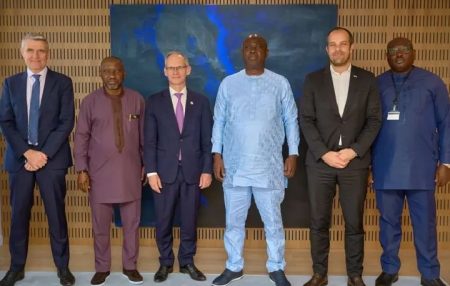 08 August 2012, Sweetcrude, LAGOS – THE Lagos government has urged the Ministry of Petroleum Resources to raise the tempo of exploration for oil and gas in the Dahomey basin as well as offshore Lagos.
08 August 2012, Sweetcrude, LAGOS – THE Lagos government has urged the Ministry of Petroleum Resources to raise the tempo of exploration for oil and gas in the Dahomey basin as well as offshore Lagos.
State governor, Babatunde Raji Fashola, made the plea at the opening of the 36th Society of Petroleum Engineers’ Nigeria yearly international conference and exhibition in Lagos.
Besides helping Nigeria to boost its reserves and prioduction, oil and gas discovery in the Dahomey basin would raise the profile of Lagos State as the basin covers the state.
He maintained that the Ministry, working through the Department of Petroleum Resources and the Nigerian National Petroleum Corporation, could make this possible.
Fashola noted that Nigeria’s estimated 35 billion barrels oil reserves and over 187 trillion cubic feet of gas reserves have not been efficiently utilised, pledging Lagos government’s support for possible partnership towards effective exploitation of the oil and gas resource.
“Lagos State has all it takes to partner with and support the Federal Government in achieving this goal. The state falls within the Benin sedimentary basin and also among the Nigerian littoral states,” he said, and added: “Available information suggests that our offshore territorial areas are endowed with abundant hydrocarbon resources.
“This hydrocarbon belt is known to cover areas spreading towards the western flange of West Africa and up to Ghana, placing that country amongst the oil players of the world.
The governor noted as interesting and timely the conference theme, “Future of oil and gas: balance with the environment and sustainable stakeholders participation.”
“The conference is coming at a most auspicious time, a time when Nigeria is poised to implement radical reforms in the oil and gas industry that will, when implemented, certainly be an engine for growth and have a positive impact on our environment.
“I am certainly optimistic that when those reforms are in place, Nigeria will have no place in the index of nations with the paradox of having an abundance of natural resources and yet comparatively marginal economic and development,” he said.



